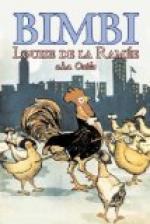Suddenly Karl Strehla struck his hand on the table, sending the pipe on the ground.
“I have sold Hirschvogel,” he said; and his voice was husky and ashamed in his throat. The spinning wheel stopped. August sprang erect out of his sleep.
“Sold Hirschvogel!” If their father had dashed the holy crucifix on the floor at their feet and spat on it, they could not have shuddered under the horror of a greater blasphemy.
“I have sold Hirschvogel!” said Karl Strehla in the same husky, dogged voice. “I have sold it to a traveling trader in such things for two hundred florins. What would you?—I owe double that. He saw it this morning when you were all out. He will pack it and take it to Munich to-morrow.”
Dorothea gave a low, shrill cry:—
“Oh, father!—the children—in midwinter!”
She turned white as the snow without; her words died away in her throat.
August stood, half blind with sleep, staring with dazed eyes as his cattle stared at the sun when they came out from their winter’s prison.
“It is not true! It is not true!” he muttered. “You are jesting, father?”
Strehla broke into a dreary laugh.
“It is true. Would you like to know what is true too?—that the bread you eat, and the meat you put in this pot, and the roof you have over your heads, are none of them paid for, have been none of them paid for for months and months; if it had not been for your grandfather, I should have been in prison all summer and autumn; and he is out of patience and will do no more now. There is no work to be had; the masters go to younger men; they say I work ill; it may be so. Who can keep his head above water with ten hungry children dragging him down? When your mother lived it was different. Boy, you stare at me as if I were a mad dog! You have made a god of yon china thing. Well—it goes; goes to-morrow. Two hundred florins, that is something. It will keep me out of prison for a little, and with the spring things may turn—”
August stood like a creature paralyzed. His eyes were wide open, fastened on his father’s with terror and incredulous horror; his face had grown as white as his sister’s; his chest heaved with tearless sobs.
“It is not true! It is not true!” he echoed stupidly. It seemed to him that the very skies must fall, and the earth perish, if they could take away Hirschvogel. They might as soon talk of tearing down God’s sun out of the heavens.
“You will find it true,” said his father doggedly, and angered because he was in his own soul bitterly ashamed to have bartered away the heirloom and treasure of his race and the comfort and health-giver of his young children.” You will find it true. The dealer has paid me half the money to-night, and will pay me the other half to-morrow, when he packs it up and takes it away to Munich. No doubt it is worth a great deal more,—at least I suppose so, as he gives that,—but beggars




